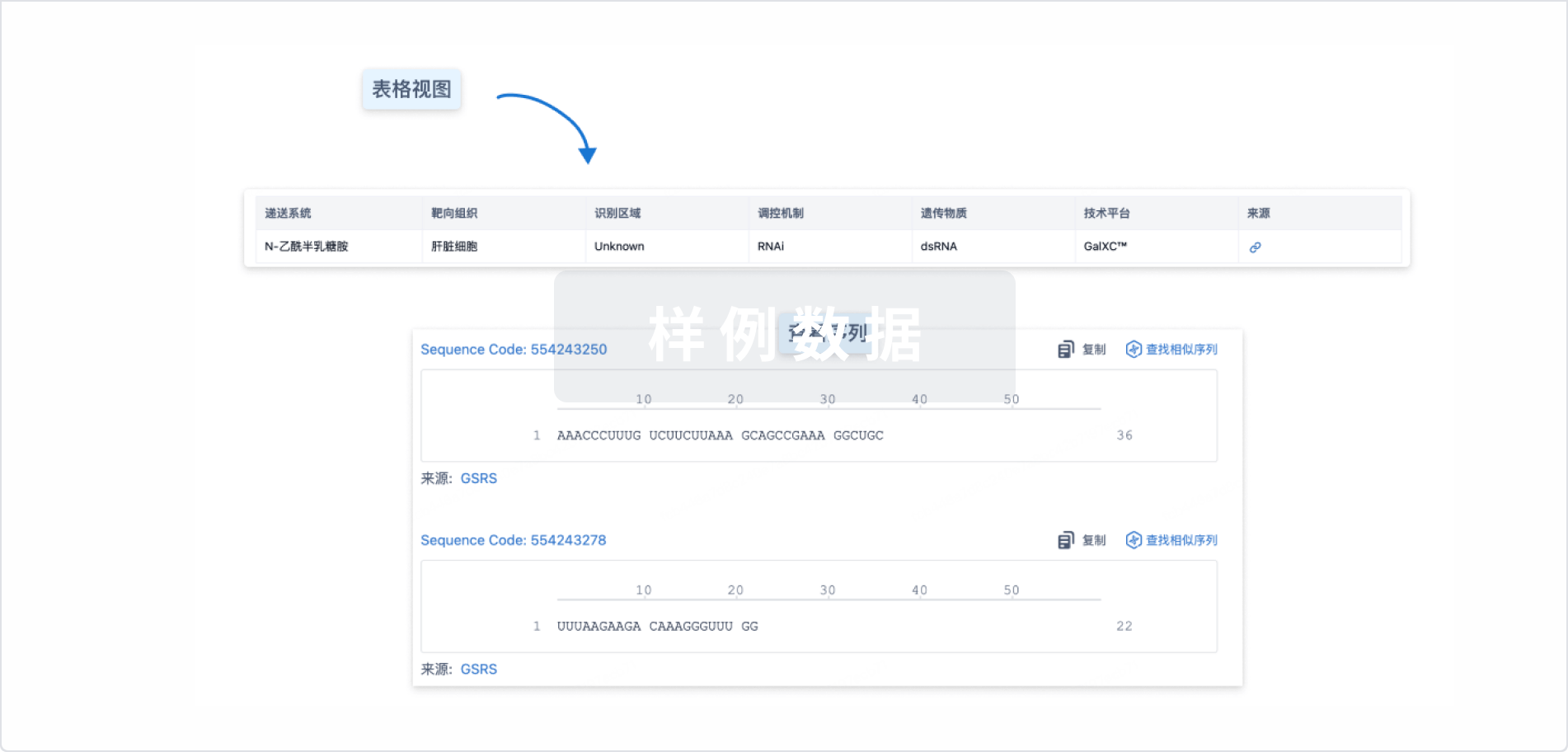预约演示
更新于:2025-10-24
BGA-002
更新于:2025-10-24
概要
基本信息
药物类型 asPNA |
别名 16 base single stranded peptide nucleic acid oligonucleotide ¿ 7 aminoacids peptide、16-base single-stranded peptide nucleic acid oligonucleotide linked to 7-amino acid peptide、BGA 002 + [1] |
靶点 |
作用方式 抑制剂 |
作用机制 N-Myc抑制剂(MYCN proto-oncogene, bHLH transcription factor inhibitors)、基因转录抑制剂 |
非在研适应症- |
原研机构 |
在研机构 |
非在研机构- |
权益机构- |
最高研发阶段临床前 |
首次获批日期- |
最高研发阶段(中国)- |
特殊审评孤儿药 (美国)、孤儿药 (欧盟) |
结构/序列
使用我们的RNA技术数据为新药研发加速。
登录
或

关联
100 项与 BGA-002 相关的临床结果
登录后查看更多信息
100 项与 BGA-002 相关的转化医学
登录后查看更多信息
100 项与 BGA-002 相关的专利(医药)
登录后查看更多信息
5
项与 BGA-002 相关的文献(医药)2024-08-01·Nucleic Acid Therapeutics
Preclinical Pharmacokinetics in Tumors and Normal Tissues of the Antigene PNA Oligonucleotide MYCN-Inhibitor BGA002
Article
作者: Bartolucci, Damiano ; Cerisoli, Lucia ; Montemurro, Luca ; Oosterholt, Sean ; Angelucci, Silvia ; Bortolotti, Sonia ; Scardovi, Anna Lisa ; Nieddu, Giammario ; Amadesi, Camilla ; Della Pasqua, Oscar ; Hrelia, Patrizia ; Tonelli, Roberto
Although MYCN has been considered an undruggable target, MYCN alterations confer poor prognosis in many pediatric and adult cancers. The novel MYCN-specific inhibitor BGA002 is an antigene peptide nucleic acid oligonucleotide covalently bound to a nuclear localization signal peptide. In the present study, we characterized the pharmacokinetics (PK) of BGA002 after single and repeated administration to mice using a novel specific enzyme-linked immunosorbent assay. BGA002 concentrations in plasma showed linear PK, with dose proportional increase across the tested dose levels and similar exposure between male and female and between intravenous and subcutaneous route of administration. Repeated dosing resulted in no accumulation in plasma. Biodistribution up to 7 days after single subcutaneous administration of [14C]-radiolabeled BGA002 showed broad tissues and organ distribution (suggesting a potential capability to reach primary tumor and metastasis in several body sites), with high concentrations in kidney, liver, spleen, lymph nodes, adrenals, and bone marrow. Remarkably, we demonstrated that BGA002 concentrates in tumors after repeated systemic administrations in three mouse models with MYCN amplification (neuroblastoma, rhabdomyosarcoma, and small-cell lung cancer), leading to a significant reduction in tumor weight. Taking into account the available safety profile of BGA002, these data support further evaluation of BGA002 in patients with MYCN-positive tumors.
2022-12-01·Journal of experimental & clinical cancer research : CR
The MYCN inhibitor BGA002 restores the retinoic acid response leading to differentiation or apoptosis by the mTOR block in MYCN-amplified neuroblastoma
Article
作者: Scardovi, Anna Lisa ; Bortolotti, Sonia ; Paganelli, Francesca ; Pasquinelli, Gianandrea ; Amadesi, Camilla ; Bartolucci, Damiano ; Martelli, Alberto Maria ; Hrelia, Patrizia ; Valente, Sabrina ; Cerisoli, Lucia ; Fischer, Matthias ; Tonelli, Roberto ; Angelucci, Silvia ; Raieli, Salvatore ; Montemurro, Luca ; Nieddu, Giammario ; Pession, Andrea ; Lampis, Silvia
Abstract:
Background:
Neuroblastoma is a deadly childhood cancer, and MYCN-amplified neuroblastoma (MNA-NB) patients have the worst prognoses and are therapy-resistant. While retinoic acid (RA) is beneficial for some neuroblastoma patients, the cause of RA resistance is unknown. Thus, there remains a need for new therapies to treat neuroblastoma. Here we explored the possibility of combining a MYCN-specific antigene oligonucleotide BGA002 and RA as therapeutic approach to restore sensitivity to RA in NB.
Methods:
By molecular and cellular biology techniques, we assessed the combined effect of the two compounds in NB cell lines and in a xenograft mouse model MNA-NB.
Results:
We found that MYCN-specific inhibition by BGA002 in combination with RA (BGA002-RA) act synergistically and overcame resistance in NB cell lines. BGA002-RA also reactivated neuron differentiation (or led to apoptosis) and inhibited invasiveness capacity in MNA-NB. Moreover, we found that neuroblastoma had the highest level of mRNA expression of mTOR pathway genes, and that BGA002 led to mTOR pathway inhibition followed by autophagy reactivation in MNA-NB cells, which was strengthened by BGA002-RA. BGA002-RA in vivo treatment also eliminated tumor vascularization in a MNA-NB mouse model and significantly increased survival.
Conclusion:
Taken together, MYCN modulation mediates the therapeutic efficacy of RA and the development of RA resistance in MNA-NB. Furthermore, by targeting MYCN, a cancer-specific mTOR pathway inhibition occurs only in MNA-NB, thus avoiding the side effects of targeting mTOR in normal cells. These findings warrant clinical testing of BGA002-RA as a strategy for overcoming RA resistance in MNA-NB.
2019-12-15·Cancer research1区 · 医学
A Novel MYCN-Specific Antigene Oligonucleotide Deregulates Mitochondria and Inhibits Tumor Growth in MYCN-Amplified Neuroblastoma
1区 · 医学
Article
作者: Falconi, Mirella ; Amadesi, Camilla ; Bartolucci, Damiano ; Teti, Gabriella ; Fischer, Matthias ; Angelucci, Silvia ; Cerisoli, Lucia ; Hrelia, Patrizia ; Raieli, Salvatore ; Lampis, Silvia ; Montemurro, Luca ; Nieddu, Giammario ; Venturelli, Leonardo ; Tonelli, Roberto ; Scardovi, Anna Lisa ; Pession, Andrea
Abstract:
Approximately half of high-risk neuroblastoma is characterized by MYCN amplification. N-Myc promotes tumor progression by inducing cell growth and inhibiting differentiation. MYCN has also been shown to play an active role in mitochondrial metabolism, but this relationship is not well understood. Although N-Myc is a known driver of the disease, it remains a target for which no therapeutic drug exists. Here, we evaluated a novel MYCN-specific antigene PNA oligonucleotide (BGA002) in MYCN-amplified (MNA) or MYCN-expressing neuroblastoma and investigated the mechanism of its antitumor activity. MYCN mRNA and cell viability were reduced in a broad set of neuroblastoma cell lines following BGA002 treatment. Furthermore, BGA002 decreased N-Myc protein levels and apoptosis in MNA neuroblastoma. Analysis of gene expression data from patients with neuroblastoma revealed that MYCN was associated with increased reactive oxygen species (ROS), downregulated mitophagy, and poor prognosis. Inhibition of MYCN caused profound mitochondrial damage in MNA neuroblastoma cells through downregulation of the mitochondrial molecular chaperone TRAP1, which subsequently increased ROS. Correspondingly, inhibition of MYCN reactivated mitophagy. Systemic administration of BGA002 downregulated N-Myc and TRAP1, with a concomitant decrease in MNA neuroblastoma xenograft tumor weight. In conclusion, this study highlights the role of N-Myc in blocking mitophagy in neuroblastoma and in conferring protection to ROS in mitochondria through upregulation of TRAP1. BGA002 is a potently improved MYCN-specific antigene oligonucleotide that reverts N-Myc–dysregulated mitochondrial pathways, leading to loss of the protective effect of N-Myc against mitochondrial ROS.
Significance::
A second generation antigene peptide oligonucleotide targeting MYCN induces mitochondrial damage and inhibits growth of MYCN-amplified neuroblastoma cells.
8
项与 BGA-002 相关的新闻(医药)2025-03-24
·精准药物
Whitfield研究员和Laura Soucek教授2025年2月19日在Nature reviews drug discovery发表了最新关于MYC靶点的综述,介绍了该靶点的研究进展,以及靶向MYC的药物开发策略,聚焦最新抑制剂和进入临床试验的药物,关注MYC 抑制剂的临床应用。近年来,研究人员开发了多种直接和间接抑制MYC的新方法,包括寡核苷酸疗法、小分子抑制剂、蛋白降解剂等。目前,一些MYC抑制剂已进入临床试验阶段,并显示出一定的疗效和安全性,这也许标志着MYC靶向治疗进入了新的阶段。
介绍
MYC 在40多年前就被确认为致癌基因,它编码一种多效性转录因子,该因子可指导参与肿瘤发生的多个细胞内和细胞外程序,MYC 通过调控这些程序,在肿瘤的形成和发展中发挥关键作用。并且,多种上游致癌信号通路都会激活MYC,使其 成为了各种肿瘤适应症和不同突变谱的理想靶点。然而多年来,它一直被认为是 “不可成药” 的靶点,这主要是由于其自身结构特点、作用机制复杂以及对正常组织潜在风险等因素。尽管如此,随着研究推进,尤其是最初研发并发表于 1998 年的Omomyc改变了人们对 MYC 的认知,使其从 “不可成药” 转变为 “难以成药但值得进一步研究” 的靶点。Omomyc 是一种由 91 个氨基酸组成的微型蛋白,作为 MYC 的显性负调控因子发挥作用,在肿瘤治疗中取得显著疗效,同时在正常组织中仅引起轻微且可逆的副作用。基于 Omomyc 研发的 OMO-103 是首个进入临床试验的相关药物,并初步验证了药物的安全性和有效性。
图1 | MYC:从发现到走上临床试验的时间线
MYC的家族成员:c-MYC, MYCN(N-MYC), MYCL(L-MYC)都属于近端 MYC 网络,这个网络中的蛋白质都具有相似的 DNA 结合和二聚化结构域:碱性螺旋 - 环 - 螺旋亮氨酸拉链(bHLHZ)。MYC 家族成员除了 C 端的 bHLHZ 结构域,还包含 N 端反式激活结构域(TAD)和中央区域。这些区域中的 MYC 盒虽能与转录调控相关辅因子相互作用,但结构不明确,使得大多数针对 MYC 抑制策略的结构研究集中于 bHLHZ 结构域。正常情况下,MYC 表达与细胞增殖相关转录程序有关,且受到严格调控,蛋白半衰期约 20 分钟,通过有序磷酸化和蛋白酶体降解进行调节。然而在癌症中,MYC 会因基因易位、扩增或上游如 Notch、Wnt-β-catenin 等致癌信号通路的持续激活和稳定而失调。
肿瘤对 MYC 的依赖通过持续信号传导建立,而非 MYC 的绝对水平。所以MYC 影响肿瘤的几乎所有标志性特征,包括生长、增殖、蛋白合成、代谢改变、血管生成和免疫抑制等。也因此,MYC 成为癌症研究中热门的靶点,促使全球研究团队开发直接或间接抑制其在癌细胞中功能的策略。
直接抑制 MYC 的方法
最早的 MYC 抑制剂大约在二十年前进入临床试验,在 OMO - 103 最近开展试验之前,所有这些抑制剂都已被终止研发或者没有再进一步推进。表 1 总结了直接靶向 MYC 的抑制剂的临床情况 。下面简单介绍一下相关抑制剂的情况。
1.核酸类抑制剂
2.反义寡核苷酸(ASOs):早期的 INX - 3280 进入临床试验但终止;之后的AVI - 4126 被发现后在临床试验中显示出生物利用度,但多用于心血管试验;经修饰的 MYCASOs 在肝癌模型有一定效果。
3.诱饵寡核苷酸:通过携带 MYC 的共识结合序列(E - box)与内源性 DNA 竞争结合转录因子来抑制 MYC。虽有体外效果,但体内研究未推进。
4.siRNA :DCR - MYC 通过脂质纳米颗粒(LNPs)递送进入 I 期和 Ib/II 期临床试验,但因基因沉默不足而终止。近期,Hu 等人开发的修饰后的 siRNA 脂质体在治疗胶质瘤小鼠模型中显示出一定效果,提示优化 siRNA 递送系统可能提高其临床应用潜力。
5.肽核酸(PNA):Biogenera SpA 开发的针对 MYCN 的抗基因肽核酸 BGA002,在临床前研究中与维甲酸联合使用,可激活神经母细胞瘤细胞系的神经元分化,在小鼠模型中能减少肿瘤血管化,提高生存率。BGA002 已获得多项孤儿药认定,公司计划开展临床试验。
6.G - 四链体(G4)稳定剂:利用 MYC P1 启动子中 G4 结构开发的 G4 稳定剂可阻止 RNA 聚合酶转录,从而抑制 MYC 表达。多种 G4 稳定剂如 D089、EP12 等在细胞和动物模型中显示出抑制肿瘤细胞生长的活性,部分已进入临床试验,但由于 G4 在基因组中的相似性,这些化合物的抗癌活性是否真由特异性靶向 MYC 介导仍存在争议,目前研究聚焦于提高其对 MYC 的选择性。
7.小分子抑制剂:主要通过破坏 MYC - MAX 异源二聚化和与 DNA 的结合来抑制 MYC。高通量筛选等方法发现了多个有潜力的小分子,如 MYCMI - 6、MYCi975 等,在多种肿瘤细胞系和动物模型中显示出抑制肿瘤生长的效果,但除 AntiMYCon(N77)外,多数尚未进入进一步临床开发。
8.肽和小蛋白方法:Omomyc是一种 91 个氨基酸的小蛋白,作为 MYC 显性负性抑制剂,通过与 MYC、MAX 形成转录无活性的复合物来干扰 E - box 结合和转录激活。Omomyc 在转基因小鼠和癌症细胞模型中广泛验证了其抑制 MYC 的效果,基于此开发的 OMO - 103 已进入临床试验,显示出安全性和初步疗效。它由 Peptomyc 公司研发,目前正处于针对转移性胰腺癌的 Ⅰ 期临床试验阶段,此前还曾针对包括非小细胞肺癌、三阴性乳腺癌和结直肠癌在内的实体瘤开展研究 。
9.其他肽类抑制剂:如基于 MYC HLH 结构域螺旋 1(H1)开发的融合蛋白 PNDD1 和热靶向版本的 H1,在临床前研究中显示出抑制 MYC 的活性,但尚未进入临床试验。IDP Discovery Pharma 公司的 IDP - 121 短肽已进入 I/II 期临床试验,用于治疗难治性或复发性血液系统恶性肿瘤;IDP - 410 stapled 肽可靶向 N - MYC,在治疗胶质瘤的小鼠模型中显示出疗效,但目前尚无其进入临床开发的信息。
10.MYC降解剂:利用蛋白降解技术开发,如 WBC100 进入临床试验,ProMyc 等在动物模型有疗效。
Fig. 3 | Inhibitors of MYC–MAX dimerization and DNA binding
Fig. 4 | MYC degraders
间接抑制 MYC 的方法
1.调节相关蛋白:
稳定 MAX 同源二聚体:2019 年发现的 KI-MS2-008 能稳定 MAX 同源二聚体抑制癌细胞生长,但临床应用及对 MYC 近端网络的影响有待研究。
利用 MXD1 相关蛋白:小蛋白 Mad 可结合 MAX 和 E-boxes 抑制 MYC,但缺乏体内数据和后续研究。
2.干扰翻译过程:eIF4A1 是 eIF4F 翻译起始复合物的核心解旋酶,在多种肿瘤中高表达,通过多种靶向策略可干扰其与 MYC mRNA 的结合,进而抑制肿瘤细胞生长,为癌症治疗提供新方向。例如在髓母细胞瘤和慢性淋巴细胞白血病模型中,相关抑制剂能抑制细胞增殖。eIF4F 靶向药物已进入临床试验,其后续在 MYC 高表达肿瘤中的疗效也受到研究者的关注。
3.BET 抑制剂(BETi):BETi 通过抑制 BET 蛋白降低 MYC 表达,但在部分肿瘤中效果不佳且有脱靶毒性,疗效与 MYC 表达关系尚不明确,仍需进一步研究。
4.其他降解剂:MRT-2359 作为 GSPT1 分子胶降解剂进入 I/II 期临床试验,dBET1 可降解 BRD 蛋白降低 MYC 水平,但暂无进一步开发进展。
5.表观基因组调节:OTX-2002 通过表观遗传调节下调 MYC 表达,正在进行 I/II 期临床试验,初步数据良好。
6.CDK9 抑制:CDK9 抑制剂 KB-0742 在 I/II 期临床试验表现良好,已进入 II 期用于治疗相关肿瘤。
7.其他策略:细菌蛋白酶 Lon、aureolic acid 类抗生素、热疗、抗 MYC 纳米抗体等在抑制 MYC 方面有一定效果,但各有局限性或仍在早期研究中。
总结
针对 MYC 的直接和间接抑制策略众多,多种抑制剂已进入临床试验阶段,这表明 MYC 成为临床可成药靶点的目标或许即将实现。但部分有潜力的抑制剂因技术或资金问题被放弃,随着技术的进步,如病毒递送 shRNA、纳米载体封装等技术的进步,这些抑制剂值得重新评估和研究。
在 MYC 靶向治疗领域,未来有着多方面的发展方向。首先,需明确 “MYC addiction” 的生物标志物,以此确定能从 MYC 抑制剂治疗中获益的癌症患者,实现精准治疗。其次,鉴于 MYC 的多效性和在耐药中的作用,联合现有疗法进行治疗,有望产生协同效应并克服耐药性,特别是与免疫检查点抑制剂联合可增强癌症免疫治疗效果。再者,正在进行的多项评估 MYC 靶向化合物的临床试验至关重要,其结果将推动该领域发展,加速 MYC 抑制剂的临床应用,造福更多癌症患者。最后,由于 MYC 在多种细胞过程中发挥作用,其抑制剂未来不仅局限于癌症治疗,还可能拓展到其他疾病领域,为更多患者带来新希望。
参考文献
Whitfield, J.R., Soucek, L. MYC in cancer: from undruggable target to clinical trials. Nat Rev Drug Discov (2025). https://doi.org/10.1038/s41573-025-01143-2
声明:发表/转载本文仅仅是出于传播信息的需要,并不意味着代表本公众号观点或证实其内容的真实性。据此内容作出的任何判断,后果自负。若有侵权,告知必删!
长按关注本公众号
粉丝群/投稿/授权/广告等
请联系公众号助手
觉得本文好看,请点这里↓
AACR会议寡核苷酸信使RNA
2024-07-02
BIOGENERA SpA has officially signed an agreement with CVBF (Consortium for Biological and Pharmacological Evaluations) to monitor and execute the phase I clinical trial of the new drug BGA002, intended for the treatment of aggressive pediatric cancers associated with alterations in the MYCN tumor gene.
BIOGENERA has chosen CVBF as its Clinical CRO (Contract Research Organization) because of its years of experience in developing new biologic drugs for pediatric diseases. CVBF has successfully collaborated with numerous sponsors, research centers internationally in the pharmaceutical and biotechnology fields.
CVBF is part of several European research networks for knowledge transfer and scientific excellence. Key collaborations include TEDDY European Network of Excellence for Paediatric Research, European CRO Federation (EUCROF), and iCAN Network (International Children’s Advisory Network), all of which are committed to promoting the development of safe and effective new drugs for children.
The primary goal of the collaboration between BIOGENERA and CVBF is to initiate clinical phase I of the anti-cancer drug BGA002 in early 2025, also taking advantage of the benefits of the Orphan Drug designation obtained from both the European Medicines Agency and the U.S. FDA.
CVBF will support BIOGENERA in conducting the study not only at Italian clinical centers of excellence, but also at the European level, with the intention of completing it quickly.
As a reminder, there are only a few days left (until Friday, June 28) to invest in BIOGENERA’s campaign on Mamacrowd, with numerous benefits associated with the Paris listing. Don’t miss the opportunity to participate in creating new targeted, effective and safe treatments for cancers and other serious diseases. Find out here: https://mamacrowd.com/it/project/biogenera
临床1期孤儿药
2024-06-20
Funding from the European Community (Horizon program) has been approved for the biomedical research program called ARACHNID (Automated canceR-on-A-CHip orgaN-specific metastatIc spreaD), which will be carried out in collaboration between BIOGENERA’s R&D team and the research group of Prof. Elisa Cimetta of the University of Padua.
The research program aims to develop a new, unique and automated bionanotechnology platform for simultaneous analysis of the complex evolution of human tumor-metastasis-on-a-chip (TMOC) in various human organ models.
In fact, the spread of cancer metastasis to various organs is what makes cancers deadly. The platform will aim to simulate the evolution of cancer metastasis in organs, avoiding the use of animals for experimentation.
The platform will also be used to evaluate the effect of BIOGENERA’s new anti-cancer drug BGA002, intended for the treatment of neuroblastoma and other pediatric and adult cancers with alterations in the MYCN tumor gene, which are frequently associated with aggressive and metastatic tumors.
The results of biotechnological and pharmacological research could be a major step forward, reducing costs and time for the development of increasingly innovative and targeted therapies, with the goal of eliminating the use of animals in experimentation. They will also enable prediction of the anti-metastatic efficacy of the new drug BGA002 and other new drugs.
临床研究
100 项与 BGA-002 相关的药物交易
登录后查看更多信息
研发状态
10 条进展最快的记录, 后查看更多信息
登录
| 适应症 | 最高研发状态 | 国家/地区 | 公司 | 日期 |
|---|---|---|---|---|
| 神经母细胞瘤 | 临床前 | 意大利 | 2022-04-30 | |
| 软组织肉瘤 | 临床前 | 意大利 | 2022-04-30 | |
| 小细胞肺癌 | 临床前 | 意大利 | - |
登录后查看更多信息
临床结果
临床结果
适应症
分期
评价
查看全部结果
| 研究 | 分期 | 人群特征 | 评价人数 | 分组 | 结果 | 评价 | 发布日期 |
|---|
No Data | |||||||
登录后查看更多信息
转化医学
使用我们的转化医学数据加速您的研究。
登录
或

药物交易
使用我们的药物交易数据加速您的研究。
登录
或

核心专利
使用我们的核心专利数据促进您的研究。
登录
或

临床分析
紧跟全球注册中心的最新临床试验。
登录
或

批准
利用最新的监管批准信息加速您的研究。
登录
或

特殊审评
只需点击几下即可了解关键药物信息。
登录
或

生物医药百科问答
全新生物医药AI Agent 覆盖科研全链路,让突破性发现快人一步
立即开始免费试用!
智慧芽新药情报库是智慧芽专为生命科学人士构建的基于AI的创新药情报平台,助您全方位提升您的研发与决策效率。
立即开始数据试用!
智慧芽新药库数据也通过智慧芽数据服务平台,以API或者数据包形式对外开放,助您更加充分利用智慧芽新药情报信息。
生物序列数据库
生物药研发创新
免费使用
化学结构数据库
小分子化药研发创新
免费使用
